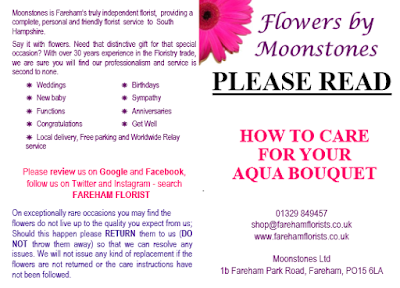Funerals
I've visited some on a personal level to organise a loved ones
funeral but that's just the front-of-house aspect of the business. I've
popped flowers into cold rooms, dressed coffins and wicker caskets, but
again, they were placed in specific rooms for me (for the most part; one
on a few occasions during the winter months has made me work in the
garage area!) so I didn't have to think about what was needed to get the
casket ready for me to do what I had to do.
I've said to myself on a few occasions, "Goodness, that's extortionate," when faced with the costs of organising a funeral. I now confess that I was completely ignorant and feel slightly ashamed for thinking that way. I know how frustrating it is when a customer tells me they can "get it cheaper elsewhere" or accuses me of 'ripping them off,' unaware of the actual costs involved in running my business. Being constantly accused of profiteering is one of the worst aspects of owning a business. If only people knew the real truth. I realise now that I was just like those people when it came to understanding the world of funeral directors. I can assure you, I no longer think that way.
The reason I no longer think that way is because, earlier this week, I had the privilege of spending an afternoon at a funeral director's. The lady who kindly showed me around was incredibly passionate about her work and demonstrated wonderful compassion for the people she serves. I had assumed that after doing the job for so long, they might become a little shut-off or complacent—not in a negative way, but as a means of coping with their work. I was so wrong. Every person they deal with is treated with kindness and compassion, just as they would want their own loved ones to be treated.
I was given access to where they initially take a loved one and explained how they prepare the person to be viewed. Even if there is to be no viewing of the person in their care they are still treated with the same kindness and compassion. I got to look in cupboards at the products they must have, and learned about the costs of some of the necessary items they cannot operate without - things I would never have thought about, which do not come cheap due to their exclusivity. I saw cupboard upon cupboard filled with different products and lotions that need to be used. Even something as simple as a pack of razor blades - something I would never have considered. The costs, when you begin to examine everything in detail, soon mount up.
I'm not sure if you have aircon or large fridges where you live/work. If you do you will know the cost involved with running these. Funeral directors need to have a cold room (actually by law they don't but most I know of have them anyway). I know from personal experience that just running a small unit in the shop 24/7 costs around £100 each week. They are having to use specialist equipment to ensure an even temperature at all times. Their electric bills are astromical.
They need to purchase pillows, blankets and gowns to ensure the comfort
of your loved one; yes I am aware that may sound a little odd to some of
you, but that is the level of respect they are showing to people.
They can't just pop a coffin in the back of an estate car; they have to use a specially made vehicle; a hearse. At a cost of £80000! Like all vehicles this has to be maintained, all of which comes at a cost. In fact they probably have to maintain their vehicles far more than any other business. Imagine a hearse breaking down on its way to a funeral. Then there are the limosines for the family to travel in. Again, these aren't you run-of-the-mill MPV. They are specially designed vehicles that have to be kept in prime condition day-in, day-out. I clean my car once-a-year (my brother cleans it for me a couple more times). They have to to clean their vehicles every day. Not just a quick jet wash, they need to make sure they are gleaming, inside-and-out. Car cleaning products are not cheap. A run-of-the-mill valet will charge around £60 for a domestic car. They are having to valet each day. Additionally, they have to maintain a private ambulance for collecting someone once they have passed. I can only imagine how high their fuel bill must be.
Like other businesses on top of all these costs they also have insurances, tax bills, VAT, utilities (which are way higher than domestic rates).
The most moving yet beautiful moment of my visit was when I was shown a box where they keep outfits for babies, not just because they were so tiny and never got the chance to experience life but because some of them have been made from bridal gowns. Rather than sell them, leave them in a clothes bag in a cupboard for eternity, or send them off to the dump some brides will donate their dresses which are then made into outfits for the babies. The outfits were so beautiful, as was the whole sentiment behind them being created in the first place.
I complelely understand how people can think they are being fleeced when it comes to funerals, but I can honestly say (hand-on-heart) having spent my time with them I am genuinely amazed they make any money at all. I've definitely had my eyes opened and I feel that my business and customers will benefit from my visit.





















Comments
Post a Comment